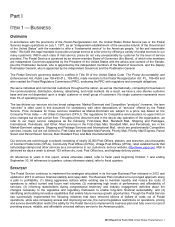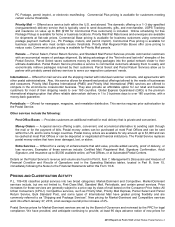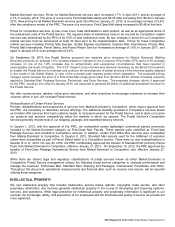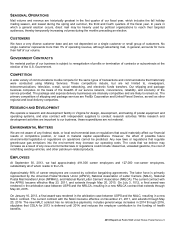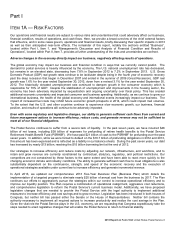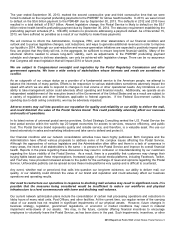US Postal Service 2013 Annual Report Download - page 13
Download and view the complete annual report
Please find page 13 of the 2013 US Postal Service annual report below. You can navigate through the pages in the report by either clicking on the pages listed below, or by using the keyword search tool below to find specific information within the annual report.2013 Report on Form 10-K United States Postal Service 11
An unduly burdensome union contract arrived at either through negotiation or arbitration could have a
significant adverse impact on our future results of operations by impacting our control over wages and benefits
and/or by limiting our ability to manage our workforce effectively.
The majority of our labor force is represented by labor unions and covered by collective bargaining agreements, primarily
with the APWU, NALC, NPMHU, and the NRLCA. The agreements currently in force include provisions for mandatory
cost-of-living adjustments (COLA), which are linked to the Consumer Price Index – Urban Wage Earners and Clerical
Workers (CPI-W). Although the increases in the CPI-W have been relatively low since its 2008 peak when it conferred
annual pay increases to employees of nearly $1.1 billion, a resurgence of consumer inflation could have a significant
adverse impact on our labor costs. The agreements also contain provisions that limit our ability to reduce the size of the
labor force. Reductions in the size and cost of our labor force are necessary to offset the effects of declining volumes and
revenues.
The ability to negotiate contracts that control labor costs is essential to maintaining financial stability. Failure to do so, or
an unfavorable decision by an arbitrator during binding arbitration, could have significant adverse consequences on our
ability to meet financial obligations.
We have no assurance that we will be able to negotiate contracts in the future with our unions that will result in a cost
structure that is sustainable within current and projected future revenue levels. In addition, if our future negotiations should
fail and involved parties proceed to arbitration, we would be deprived of control in the collective bargaining process. The
risk of an adverse outcome rises in arbitration, as there is no current statutory mandate requiring an interest arbitrator to
consider the financial health of the Postal Service in issuing an award. An unfavorable award in arbitration could have
significant adverse consequences on our ability to meet future financial obligations.
We rely on the terms and conditions of our contracts with vendors and customers to deliver our services. These
contracts are renegotiated on a routine and periodic basis. Significant changes in the costs, pricing, or terms
associated with these contracts could adversely affect our business.
Our vendors and customers enter into long-term contracts with us to supply goods and services and to procure our
services. These contracts are renegotiated from time to time and to the extent that contracts are not renewed, are
renewed with terms that may not sufficiently cover our costs, or increase our costs, our financial condition may be
adversely affected. While no single customer or vendor is material to the Postal Service as a whole, certain vendors and
customers are significant to the delivery of certain product lines. Our ability to maintain current or improved terms in our
contracts with our customers and vendors is critical to our initiatives to return to profitability.
Fuel expenses are a material part of operating costs. A significant increase in fuel prices could adversely affect
costs and results of operations.
We are exposed to changes in commodity prices, primarily for diesel fuel, unleaded gasoline, and aircraft fuel for
transportation of mail, and natural gas and heating oil for facilities. The price and availability of fuel can be unpredictable
and is beyond our control. Unlike commercial entities, we are unable to institute fuel surcharges in our pricing model. A
1% increase in fuel costs would result in a $28 million increase in expense. We did not use derivative commodity
instruments to mitigate the financial risk of changes in energy prices during the periods covered by this report.
We rely extensively on computer systems and technology to manage the delivery of mail, process transactions,
summarize results, and manage our business. Disruptions in both our primary and secondary (back-up) systems
could harm our ability to run our business and potentially result in significant losses of revenue or additional
operating costs. In addition, such disruptions could impair our reputation for reliable service, which would also
adversely affect results of operations.
Our operational and administrative information systems are among the largest and most complex systems maintained by
any organization in the world. Any disruption to our complex infrastructure, including those impacting the computer
systems which facilitate mail handling and delivery and customer-utilized websites, could adversely impact customer
service, mail volumes, and revenues, and result in significant increased cost. Any significant systems failure could cause
delays in the processing and delivering of mail or result in the inability to process operational and financial data. System
failures such as this could damage our reputation, resulting in loss of business and increased costs.


